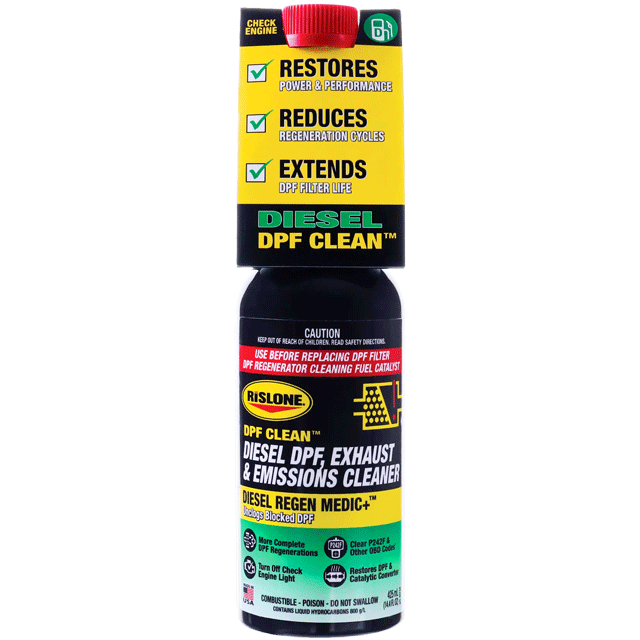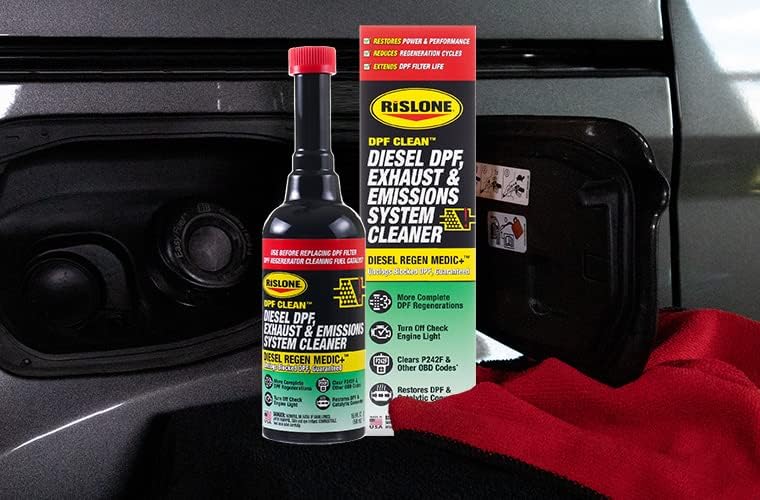Smits Group Pty Online Store
RISLONE Clean Diesel DPF, Exhaust & Emissions System Cleaner 44744
RISLONE Clean Diesel DPF, Exhaust & Emissions System Cleaner 44744
5.0 / 5.0
(143) 143 total reviews
Couldn't load pickup availability
![]()
DPF CLEAN® Diesel DPF, Exhaust & Emissions System Cleaner features high-performing detergents and heavy duty cleaning solvents that effectively scrub and remove contaminants, soot, carbon build-up, and oily residue from the fuel injectors, combustion chambers, turbo, EGR, diesel oxidation catalyst, diesel particulate filter and exhaust system.
This formula is your single-bottle solution to help your diesel vehicle restore lost power/performance, unclog blocked DPF, turn off check engine light, and clear P242F and similar OBD codes. Use once every 8000km to keep your diesel running at its best, extend DPF life, and reduce regeneration cycles. Features money back guarantee.
- Restores Power & Performance
- Reduces Regeneration Cycles
- Extends DPF Filter Life
Dosage & Directions
Dosage
Light Duty Diesel - (up to 125L fuel tank) Add entire bottle of Diesel DPF, Exhaust & Emissions System Cleaner into approximately ¼ full tank truck or large SUV, (½ full tank for car or small to mid-size SUV) of diesel fuel.
Directions
Drive vehicle ideally in a lower gear than you normally would, if possible, for 32 to 48 kms. Continue to drive vehicle normally and full tank with diesel fuel. For vehicles with extremely dirty filters, a force regeneration may now be initiated. If light is still on, second application may be required, or mechanical attention is needed.
Frequently Asked Questions
What does Rislone DPF, Exhaust & Emissions System Cleaner do?
DPF CLEAN® Diesel DPF, Exhaust & Emissions System Cleaner has high-performing detergents and heavy-duty cleaning solvents that effectively scrub and remove contaminants, soot, carbon build-up, and oily residue from the fuel injectors, combustion chambers, turbo, EGR, diesel oxidation catalyst, diesel particulate filter and the exhaust system. These, along with other active chemical agents, react with the gases created in the combustion process to remove the remaining inorganic deposits. This process restores their function and with regular use, maintains efficiency.
Can a clogged diesel particulate filter or catalytic converter be cleaned?
Yes, many times it can, especially if you catch it early and it is not completely blocked.
How much do I use?
One full bottle is used to treat light duty vehicles. Medium and Heavy Duty Diesel - 151 to 302L tank capacity use 1.5 bottles. 306L and larger use 2 bottles.
How often should this be used?
Regular use every 8,046km tunes-up the fuel, emissions, and exhaust systems, keeping them clean and preventing frequent regeneration. This also saves on expensive fuel system and emission control repairs.
Will this work with all types of diesel fuel requirements?
Yes, Rislone DPF, Exhaust & Emissions System Cleaner works with all ULSD, regular diesel-off road, and bio-diesel blends B2, B5, and B20.
Can I use in gasoline engines?
No, Rislone DPF, Exhaust, & Emissions Systems Cleaner is only designed to be used with diesel engines.
How does the emission and exhaust system get dirty?
As fuel is burned, contaminating byproducts are created that get circulated throughout various vehicle systems. These systems are designed to be able to handle this process during most normal engine operation. However, the use of poor-quality fuel, short driving distance, cold weather, improper maintenance, and component failure can create and greatly increase the amount of contamination and deposits inside these systems.
What is a DPF?
The DPF or Diesel Particulate Filter is an emission control device mounted in the vehicle exhaust system that catches and stores exhaust ash particles and other contaminants to reduce particulate matter (PM) emissions from diesel engines. While there are numerous types of DPFs (silicon carbide DPFs, metal fiber DPFs, cordierite DPFs), cellular ceramic honeycomb filters are most common. Soot that is trapped needs to be removed to enable proper performance of the filter. This process is called DPF regeneration. During DPF regeneration, excess soot in the filter is burned off.
What causes a DPF to go bad?
Vehicle manufactures say that the DPF should last the life of the vehicle, but in the real world this is usually not the case. Many things can cause the DPF to malfunction, but in most of these cases it is caused by improper or lack of regeneration cycles. The regeneration of a diesel particulate filter only occurs when certain criteria are met. Some of the factors that may impact it are engine temperature, vehicle speed, vehicle RPM, and exhaust gas temperature. If the regeneration cycles are not properly occurring or performing at maximum levels, this causes excess soot to build up in the DPF, eventually causing failure.
What are symptoms of a clogged or restricted DPF?
Because of the increased backpressure that builds up from a clogged DPF, the vehicle will have drivability issues like low power and performance, reduced fuel economy, hard starting, stalling, increased emissions and check engine light illumination.
Will this product harm the DPF, SCR or DEF system?
No, this will not harm your engine or any emissions components. This product is specifically designed to be safe to use on vehicles which diesel oxidation catalyst, diesel particulate filters, selective catalytic reduction systems and DEF systems. Likewise, it will not void manufacturer’s new vehicle warranty. Exceeds EPA compliance performance criteria.
How do I repair a clogged DPF without replacing it?
Using a product like DPF CLEAN® Diesel DPF, Exhaust & Emissions System Cleaner should be the first step before replacing the DPF, which can be quite expensive. This not only gives the vehicle the best chance of being repaired affordably, but also works to fix a contributing issue which may have caused the problem with the converter.
What is the most common diesel check engine light CEL code?
The number one check engine light code is P242F - it has sister related codes which are P2002, P2459 and P2463. These codes mean that the efficiency of the DPF or diesel emissions system is below its functional threshold.
What type of diesel engines will this work on?
Regular diesel, Direct Injected (DI), Indirect Injected (IDI), Turbo Direct Injected (TDI), and turbocharged diesel engines.
Why did my vehicle fail the emissions test?
Many states or regions require regular emissions inspections before renewing vehicle plates or the first time registering. During a visual inspection if there are missing or tampered emissions components, that can be an automatic failure. It also could be something simple like a missing fuel cap or a cap with a bad seal. Defective mechanical parts that have failed would be another reason. Many times, it does not take a mechanical issue to cause a failed result on a vehicle emissions test. If you are unsure your vehicle will pass, or maybe it barely passed the last test, we recommend a fresh oil change and emissions system cleaning with Rislone DPF CLEAN® Diesel DPF, Exhaust & Emissions System Cleaner before testing. Other items to consider include the air and fuel filters if they are due for replacement. This gives your vehicle the best chance of passing.
Technical Information
SAFETY DATA SHEET
PRODUCT DATA SHEET
CODE: 44744
SIZE: 425ML
Share


I used the DPF system cleaner product and after about an hour of the engine working and maintaining a steady speed on my truck, my DPF system was completely cleaned!
I have used the diesel dpf system cleaner its does real well when it comes to consistent regens issues real good products for the money very satisfied.
Used the Rislone DPF Cleaner and found to clean all the soot from the DPF.
Diesel DPF, Exhaust & Emissions System Cleaner, I had a check engine light on and by using this treatment the light went off, this is a great product.
I bought Rislone Diesel DPF cleaner. My GM 1.6 diesel had EGR code P2457. Added as directed, cleared code and has not come on since. Saved me Tim and money from not having to pull EGR cooler.


